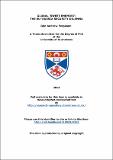Files in this item
Global ‘sweet enemies’ : the EU-Russia security dilemma
Item metadata
| dc.contributor.advisor | Anderson, John Philip | |
| dc.contributor.author | Ferguson, Iain Andrew | |
| dc.coverage.spatial | v, 226 | en_US |
| dc.date.accessioned | 2015-04-29T13:35:11Z | |
| dc.date.available | 2015-04-29T13:35:11Z | |
| dc.date.issued | 2014-06 | |
| dc.identifier.uri | https://hdl.handle.net/10023/6595 | |
| dc.description.abstract | This dissertation tells the story of conflict in the EU-Russia relationship. What makes this conflict definitive of a ‘security dilemma’, it is argued, is the unintended event of political violence in-between these neighbouring global powers. A narrative method is used to disclose the character of this ‘security dilemma’. The story it presents of ‘sweet enemies’ has twin historical and theoretical aims. The historical aim is to explain the violent instability in the making of a regional security order in-between 2003 and 2009, and in-between the borders of the EU and Russia. The theoretical aim is to frame a narrative understanding about this global relationship that describes and explains the politics of collective security in the 21st Century. The political philosopher Michael Oakeshott is the main influence on this thesis. He coined the metaphor ‘sweet enemies’ to reveal a new way of seeing the political relationships on the wing of modern Europe. He organises his study around diametrically opposing modes of political association that are, on one hand, civil and respectful of individual difference, and on the other, teleocratic and always looking to master a collective future. This dissertation presents a reframing of Oakeshott’s metaphor for the 21st Century. In this version of the story, the relationship of Sweet Enemies is completely uncivil. The associates are global others that move in-between radically polarised modes of political association that are of the same teleocratic kind. This teleocratic politics explains the conflict in the EU-Russia relationship. But it also explains why this conflict did not have to happen, and does not have to be repeated. The existence of this ‘security dilemma’ is contingent on the global choice(s) the EU and Russia make at the beginning of their relationship. Having lived through an uncomfortably close and violently unstable experience in the making and breaking of a regional security order, it is possible these global ‘sweet enemies’ will come out the other side having learnt something from this experience. This narrative retelling of Oakeshott’s metaphor is intended as an aid to learning about the condition of an uneasy global relationship in the first decade of the 21st Century. This is a time defined by permanent war. But it remains the only time there is. The conclusion is the EU-Russia ‘security dilemma’ is an ongoing issue. Indeed, the strains of discord that characterise this condition of global ‘sweet enemies’ have, if anything, become more intractable and uncivil. | en_US |
| dc.language.iso | en | en_US |
| dc.publisher | University of St Andrews | |
| dc.subject.lcc | D2025.5R8F4 | |
| dc.subject.lcsh | European Union countries--Foreign relations--Russia (Federation) | en_US |
| dc.subject.lcsh | Russia (Federation)--Foreign relations--European Union countries | en_US |
| dc.subject.lcsh | Security, International | en_US |
| dc.title | Global ‘sweet enemies’ : the EU-Russia security dilemma | en_US |
| dc.type | Thesis | en_US |
| dc.type.qualificationlevel | Doctoral | en_US |
| dc.type.qualificationname | PhD Doctor of Philosophy | en_US |
| dc.publisher.institution | The University of St Andrews | en_US |
This item appears in the following Collection(s)
Items in the St Andrews Research Repository are protected by copyright, with all rights reserved, unless otherwise indicated.

